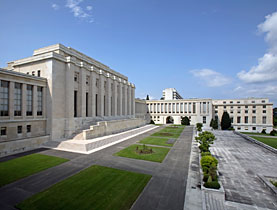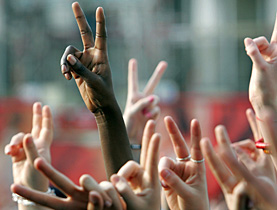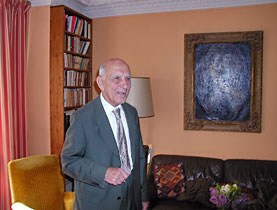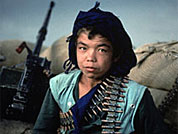Contentious UN racism meeting begins in Geneva

Preceded by a barrage of criticism and threatened with boycott, a United Nations conference on racism opened on Monday missing some of the world's biggest players.
The four-day meeting in the Swiss city of Geneva is the sequel to a divisive 2001 gathering in Durban, South Africa, and will not include Barack Obama, the first black president of the United States.
The US, along with Canada, Israel, Italy, Australia, New Zealand, the Netherlands and Germany pulled out of the UN’s second major race meeting, dubbed Durban II, before it began.
They voiced fears it would be a platform to criticise the West. Britain has sent diplomats despite concerns the meeting could become a forum for Holocaust denial or anti-Semitism.
UN Secretary-General Ban Ki-moon defended a disputed conference text as “carefully balanced” and said the conference was necessary to confront simmering racial tensions that could otherwise trigger social unrest and violence.
“I deeply regret that some have chosen to stand aside. I hope they will not do so for long,” he told the Geneva meeting.
A compromise draft for the conference’s final text – negotiated well in advance of the opening – does not include references to the touchy matters of Israel or defamation of religion.
But the new declaration’s re-affirmation of the Durban declaration has bestowed the Geneva summit with the same contentiousness and bickering that characterised the meeting in South Africa. Eight years ago, the United States and Israel walked away after the final communiqué singled out the Jewish state.
The UN wants to stay away from controversy. In case it needed to be said, an official last week reaffirmed that “hate speech and racist insults will be banned at the UN conference against racism and intolerance”.
“There is no question of allowing a repeat of what happened in 2001 in Durban,” said Marie Heuzé, the director of the UN’s Geneva information service.
“Deeply disappointed”
At the Vatican, Pope Benedict XVI said the conference was needed to eliminate racial intolerance around the world. One Catholic news agency said of the pope’s comment: “The Holy See is distancing itself from the criticisms of some Western countries.”
“I am shocked and deeply disappointed by the United States’ decision not to attend,” said UN human rights chief Navi Pillay, who is hosting the conference. She conceded some countries were focusing solely on one or two issues to the detriment of the fight against intolerance, but said it was essential that the issue of racism be tackled globally.
Some conference participants may be provocative: Mahmoud Ahmadinejad, Iran’s president, will speak on the opening day. On Sunday evening, he met President Hans-Rudolf Merz of Switzerland, the country that represents the diplomatic interests of the US in the Islamic republic.
Earlier in the day on Iranian television, Ahmadinejad said Israel was the “bearer of racism”. He has called the Holocaust a “myth” on several occasions.
“The provocations and aberrations can come from both the Iranian president and his allies as they can from the defenders of Israel,” said Adrien-Claude Zoller, the director of the non-governmental organisation Geneva for Human Rights.
Zoller told swissinfo that the success of the summit would ultimately rest upon the ability of participating countries to temper any provocations.
Symbolic conflict
Yves Lador, a human rights consultant, says the discord highlights a troubling history of Western powers. He said: “The problem of the colonial legacy is still here, still causing frustration and anger in the former colonies. The former colonial powers have not given the necessary recognition to this reality.”
“The Israeli-Palestinian conflict is perceived in the formerly colonised countries as a continuation of colonisation,” he says. “There is an identification with the Palestinians whose territory was colonised by Israel.”
Hillel Neuer, the director of UN Watch, a pro-Israel watchdog, said: “These UN conferences on racism are intended to attack Western countries, Israel and freedom of expression.”
It almost happened.
The major sticking points regarding the proposed final UN declaration are its implied criticism of Israel and an attempt by Muslim governments to ban all criticism of Islam, Sharia law, the prophet Muhammad and other tenets of their faith – a move that would limit free speech.
Many Muslim nations want curbs to free expression to prevent insults to Islam they claim have proliferated since the terrorist attacks in the United States on September 11, 2001.
They cite the 2005 cartoons of Muhammad published by a Danish newspaper that sparked riots in the Muslim world.
“An accomplishment”
Israel and Jewish groups lobbied hard against Western participation in the meeting, arguing that the presence alone of American and European negotiators would legitimise the meeting.
Nevertheless, the 2001 agreement that Western powers now want to avoid repeating was not always so controversial. It was hailed in Israel at the time for recognising the Jewish state’s right to security.
Pillay said, “I fail to see why, given that the Middle East is not mentioned in this document, that politics related to the Middle East continue to intrude into the process.”
Washington could easily have opted out of any language reaffirming the 2001 Durban Declaration, while taking part in the new agreement, she said. “And then we could have all moved on together, and put the problems of 2001 behind us.”
swissinfo with agencies
The Swiss foreign minister, Micheline Calmy-Rey, will not attend this week’s Durban review conference in Geneva.
A foreign ministry spokesman said Switzerland would be represented at the talks at ambassador level.
There was criticism of Calmy-Rey in March last year after she was pictured wearing a headscarf during a meeting in Tehran with Iranian President Mahmoud Ahmadinejad.
The United Nations Durban Review Conference will take place in Geneva from April 20-24. It will evaluate progress towards the goals set by the World Conference against Racism, Racial Discrimination, Xenophobia and Related Intolerance in Durban, South Africa, in 2001.
After a wide-ranging debate, the conference adopted by consensus an action plan to provide a new framework for guiding governments, non-governmental organisations and other institutions in their efforts to combat racism, racial discrimination, xenophobia and related intolerance.
Among its measures for combating racism are strengthening education, fighting poverty, improving resources available to victims of racism, and bolstering respect for the rule of law and for human rights. Critics say little of this has happened since 2001.
The decision to convene the Durban Review Conference was made by UN member states at a General Assembly meeting in 2006 and the UN Human Rights Council was asked to prepare the process.

In compliance with the JTI standards
More: SWI swissinfo.ch certified by the Journalism Trust Initiative




You can find an overview of ongoing debates with our journalists here. Please join us!
If you want to start a conversation about a topic raised in this article or want to report factual errors, email us at english@swissinfo.ch.